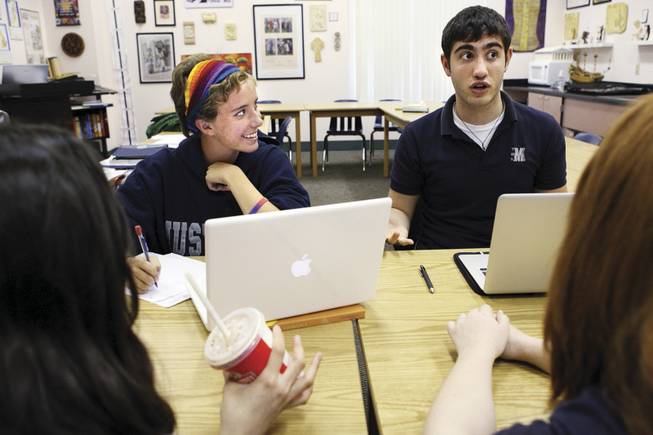
Justin Blau, right, discusses fundraising for his school-based microbank with Ashley Lovell, left, and other members of the executive council at the Meadows School on Wednesday. The project, believed to be the first of its kind in the U.S., will finance loans for poor women in Latin America.
Tuesday, Oct. 28, 2008 | 2 a.m.
Beyond the Sun
Students at a Las Vegas private school will soon offer poor women in Latin America a route out of poverty.
The group of 70 Meadows School students has raised about $20,000 so far and formed the Meadows School MicroBank, which will make small loans to impoverished women seeking to start their own businesses.
It’s believed to be the first such venture, at least of its size and scope, by a U.S. high school.
Justin Blau, a senior and the microbank’s founder and chairman, said he came up with the idea while preparing for a debate competition on the best way for the United States to address public health crises in Sub-Saharan Africa.
“While I’m researching, I’m saying to myself, ‘I’m trying to find solutions to these problems for a debate; why not try and do something in real life?’ ” Blau told the Sun.
The students expect to make their first “micro-loans” in the next few months.
The loans, of several hundred dollars, are typically too small to be profitable to financial institutions. Yet they can allow their recipients to become self-sufficient business owners by paying for a sewing machine, tortilla-making equipment, a milk cow, chickens or other items.
The Meadows School MicroBank plans to loan the money through Pro Mujer International, a nonprofit organization that aids poor female entrepreneurs.
Pro Mujer makes loans to “pods” of as many as 50 women in a single community.
“If one woman can’t make a payment, another woman will cover for her,” Blau said. “That’s what makes the model so successful, and such a low risk for us.”
Founded in 1990, Pro Mujer — modeled after Grameen Bank in Bangladesh, the founder of which won the 2006 Nobel Peace Prize — has microfinance institutions in Argentina, Bolivia, Mexico, Nicaragua and Peru.
More than $140 million will be distributed this year, with an average loan of $236. Less than 1 percent of the loan portfolio is at risk of default, according to Pro Mujer’s financial statements.
Loans are repaid with interest, which in turn supports other borrowers.
The women use the income to improve the health and education of their own children, and to help their own families and communities. That’s why Pro Mujer believes “the empowerment of women is the most effective way to alleviate poverty,” according to the organization’s Web site.
The Meadows MicroBank team had discussed lending to Clark County residents, Blau said. But after learning more about the desperate conditions of the poor, particularly children, in developing countries, Blau felt compelled to think globally, he said. Additionally, the default rate is significantly higher for U.S. micro-loans — Pro Mujer offered the lowest risk for the fledgling microbank.
Alyse Booth, a New York-based spokeswoman for Pro Mujer, said the children of micro-loan recipients are more likely to attend school and lead successful, healthy lives. “The contribution of the Meadows students has a huge impact on their own generation of young people in Latin America as well as on the mothers who are Pro Mujer members,” Booth said.
Donors who give at least $25,000 to Pro Mujer are granted “investor” status, and allowed more involvement in the lending process. Booth confirmed that the Meadows would be the first school to become one of the organization’s “investors.”
In addition to the $20,000 raised by students, an anonymous donor has pledged $5,000.
While the fine print of the arrangement is still being finalized, Pro Mujer is looking forward to a productive relationship with the students, Booth said.
In developing the microbank proposal, Blau relied on information from the Center for Economic Self-Reliance at Brigham Young University. The center is home to a BYU research project in micro-franchising — providing business opportunities to the poor, with minimal start-up costs and established business models.
Brad Hales, assistant to the center’s director, said he knows of many high schools that have staged fundraisers to benefit micro-lending organizations, but none that planned to have ongoing involvement in micro-banking, as Meadows does.
“Usually they just raise the money and that’s the end,” Hales said. “They don’t know how much is going to administration, how much to the client. It’s quite amazing that they’re are going to be involved at that level.”
Kirk Knutsen, the faculty adviser to the Meadows School MicroBank, said study of the microbank’s progress is part of the curricula of two classes at the school — “Money, Banking and Finance,” and “Social Injustice.”
Their studies and involvement with the microbank will give students a realistic view of what such philanthropy requires, Hales said.
“We have college students who come in, all excited with fire in their eyes, saying they want to start a microbank in Mexico,” Hales said. “We talk them through it, so that they understand it’s not just about doing good. There’s a lot going on in the background, and it sounds like these high school students will understand that.”
The students plan to continue fundraising. The goal is to have more than $100,000 under management within four years.
Learning about the mechanics of poverty in developing countries alongside his students, Knutsen said he’s been surprised how simple some of the solutions are.
“Twenty dollars can literally change a family’s life,” he said. “That’s something that’s hard to grasp when we’re living the American experience.”

Join the Discussion:
Check this out for a full explanation of our conversion to the LiveFyre commenting system and instructions on how to sign up for an account.
Full comments policy